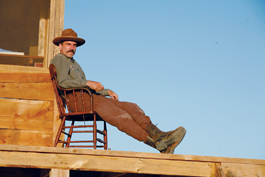home | metro santa cruz index | movies | current reviews | film review

Photograph by Melinda Sue Gordon
Porch Lizard: Daniel Day-Lewis' Daniel Plainview plans his next move in 'There Will Be Blood.'
There Will Be Blood
In this oil epic, director Paul Thomas Anderson finally finds his film.
By Richard von Busack
For a decade, director Paul T. Anderson seemed to be a masterpiece maker without a subject. He just about has a masterpiece now in There Will Be Blood, a story about the settling of California and of the unleashing of oil and evangelism on the southern half of the state. At last, Anderson has found something big enough to hitch to his personal obsessions about fatherly and familial betrayal, seen in Boogie Nights, Magnolia and Punch-Drunk Love.
Upton Sinclair's 1927 novel Oil! gives Anderson a muckraker's book to work from in this sweeping adaptation. His protagonist is an oil man during the first 20 years of the 20th century; he wages a lifelong assault on weakness around him and in himself.
Once I asked my father what his favorite football team was, and he said, "Whichever team is on the offensive." That kind of logic may be the reason Daniel Day-Lewis' Daniel Plainview is so compelling. He is on the offensive right from the film's beginning, a long, almost dialogue-free series of scenes about how Plainview crawled out of hard-rock pick-and-shovel mining and right into the infant petroleum industry.
Plainview becomes more prosperous but never loses the murderous virility that has no outlet except the seeking of money. After the death of his mining partner, Plainview inherits a child, whom he raises as his son. A serious oil-field accident strikes the boy deaf and dumb, and he is shipped away to a San Francisco school for the handicapped. Meanwhile, Henry (Kevin J. O'Connor), Plainview's brother from Fond du Lac, Wis., turns up. (The mention of the town's name is strategy; Plainview is modeled on the oil man Edward Doheny, who came from that town.)
Henry is now a half-starved wildcatter who has been in jail. Plainview has a new partner, Fletcher (Ciaran Hinds in an underwritten part), but Henry is the first person he can trust to help him on the master scheme. He has a plan to outwit the Southern Pacific and Standard Oil and to link a pipeline straight to the Pacific at Port Hueneme. The only significant obstacle in Plainview's way is a pale religious fanatic, Eli Sunday (Paul Dano), whose disciples own the land Plainview needs.
Anderson is a Generation VHS filmmaker. Like Tarantino, he wants to re-create the movies that impressed him in his youth—sometimes redoing five or six classics during the course of a film. One aspect of the film is that it seems to be a kind of unauthorized prequel to Chinatown: change the character's names, and you would have something like Noah Cross, the Early Years. The difference between Plainview and John Huston's Cross is that Plainview isn't much of a talker; he plays all his cards close to the vest and graduates from avarice to murder with little change of character.
In the finale, Anderson goes Kubrick, touring the empty halls of Plainview's tomblike mansion, with its half-finished halls and a preposterous bowling alley. The spell breaks in the last 20 minutes when Plainview at last unveils the dragon in him: here, Day-Lewis' influence changes from the fragrantly rotten Huston to the fire-spitting Robert De Niro.
Of course, there are many ways to approach the final confrontation: satanic glee, raging-bull fury, Rasputin-style delusion or the kind of explosive self-loathing that sends shrapnel flying in all directions. Day-Lewis does all these performances at once, as if he were teaching an acting class. It's like one of those long involved jazz solos that is supposed to knock you dead. Instead you are witnessing a performer so deep in his own technique that he's not thinking about how it sounds.
And this point won't matter to everyone, but a nigh-three-hour film without a serious close-up of a woman in it is almost a deal-breaker. Anderson seeks to amplify the ruthlessness of Plainview by suggesting that a woman could never be a part of such megalomania. (And yet we know that behind every evil great man is a great evil woman.) There Will Be Blood is part of a current cinematic climate that has been giving women very little, however, so it's probably wrong to pick on this one example, considering Anderson's scope and concentration.
At the very least, There Will Be Blood demonstrates how the great names of the petroleum industry made their fortunes—and still do. The parallels to today's spoilsmen hardly need outlining. It is to Anderson's credit that he doesn't underscore the way some things never change.
![]() THERE WILL BE BLOOD (R; 158 min.), directed and written by Paul Thomas Anderson, based on the novel by Upton Sinclair, photographed by Robert Elswit and starring Daniel Day-Lewis and Paul Dano, opens Friday at the Del Mar in Santa Cruz.
THERE WILL BE BLOOD (R; 158 min.), directed and written by Paul Thomas Anderson, based on the novel by Upton Sinclair, photographed by Robert Elswit and starring Daniel Day-Lewis and Paul Dano, opens Friday at the Del Mar in Santa Cruz.
Send a letter to the editor about this story.
|
|
|
|
|
|